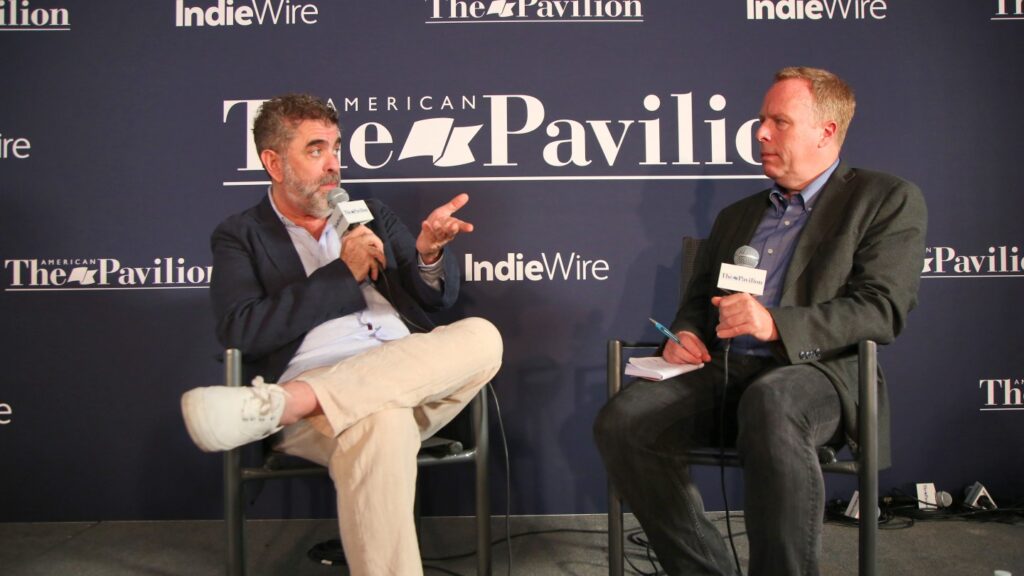For over a decade, WikiLeaks founder Julian Assange has been a lightning rod in the global debate over press freedom, transparency and the reach of U.S. power. From the release of the notorious “Collateral Murder” video to his years-long exile inside the Ecuadorian embassy in London, Assange has been hailed as a journalistic freedom fighter and vilified as a national security threat. Now, with The Six Billion Dollar Man, director Eugene Jarecki (Why We Fight, The House I Live In) turns his lens on what he calls “the most consequential political prisoner of our time,” delivering a searing exposé that uncovers the staggering cost the U.S. was willing to pay to silence him.
Jarecki’s latest documentary is a cinematic pressure cooker — part investigative thriller, part legal procedural and part character study — that digs deep into the forces aligned against Assange. Featuring interviews with human rights lawyer Jennifer Robinson, former Ecuadorian president Rafael Correa and never-before-seen footage from Assange’s time inside the embassy, the film traces the evolution of a man from renegade online publisher to political martyr. At the core is a revelation worthy of any geopolitical thriller: A $6.5 billion IMF loan allegedly dangled by the Trump administration to pressure Ecuador into handing Assange over — a modern bounty to bury a dissident voice.
The Six Billion Dollar Man premiered as a special screening in Cannes Wednesday night, with Assange in the audience. It’s already a multi-award winner, having received the first-ever Golden Globe Award for best documentary on Monday, and, on Friday, took the special jury prize of the L’Oeil d’or, or Golden Eye, awards, Cannes‘ documentary film honors.
Jarecki, who has long chronicled abuses of American power, doesn’t mince words. He describes the case as “shattering,” a prism through which to examine how democracies betray their own ideals. In a discussion at the American Pavilion in Cannes, Eugene Jarecki spoke with The Hollywood Reporter about weaponized propaganda, the perils of truth-telling in the digital age and how a man once seen as “Dr. Evil” by the U.S. government made it to the red carpet.
What first drew you to the story of Julian Assange?
It’s a delight to bring Mr. Assange to the red carpet. It’s probably the greatest achievement of my life, because it’s so important that someone like Julian Assange, who was the target of so much deeply corrupt propaganda, is finally being seen in a different light.
When we started, he was in Belmarsh Prison, Britain’s Guantanamo Bay. The idea that this inmate would be here in Cannes, a free man, was unthinkable. We asked: Why is this man in jail? Recognized as a journalist by The New York Times, the Nobel prize committee, journalism outlets all over the world — and he’s in a prison full of terrorists and violent criminals?
We might have found he did something really bad. Maybe the propaganda is true. It was our job to get to the heart of it. Then the case became more startling, the evidence more shattering. Especially what it tells us about those in power — that they were willing to spend $6 billion as a bounty on a man’s head.
How do you think Julian Assange has been misrepresented in the mainstream narrative?
The U.S. engaged in a vast smear operation against Assange. It involved allies like the U.K. and Sweden. He was given asylum by Ecuador under President Rafael Correa. Under his successor, the country was paid $6 billion to hurt Mr. Assange.
Companies like PayPal and Visa stopped payments to WikiLeaks. I used to think they liked when we made transfers — don’t they profit from that? All of a sudden capitalism went out the window.
Allegations were spread that he had been guilty of a sexual offense in Sweden. We looked into that. There never was a sexual case. There was an inquiry, which was dropped. But nobody ever knows that. Once you say “sexual this” or “sexual that,” it follows someone for the rest of their life.
The U.S. buried Assange in propaganda until someone who did that much for humanity either became unknown or had a black cloud over him. Saturday Night Live once did a bit with Bill Hader playing Assange as Dr. Evil. That sums up what the U.S. did to him.
What’s my job? I’m a documentary filmmaker. I didn’t see Assange during the filmmaking process. He was in jail. I dealt with him as a public figure on my editing screen. I’m not going to present him as an angel, but he’s probably not Dr. Evil.

The Six Billion Dollar Man
Sunshine Press Productions
Your film presents a more positive image of Julian Assange than, for example, Laura Poitras did in her 2017 documentary Risk.
In fairness to other filmmakers, the groundbreaking information just wasn’t available to them. In our case, because he was in jail, he didn’t have access to me, and I didn’t have access to him, so my personal feelings didn’t get in the way.
I had 11 years of secretly-filmed surveillance footage from the embassy. I watched hundreds of hours and most of what I saw was that Assange is not what the public has been led to believe. His actions speak for themselves. He’s had 15 years of detention. That speaks highly of a person, even if they’re not great with their cat or lack social skills.
If I had found evidence that he committed a sexual offense or violated people in war, I would have had to reflect that. But I didn’t. What I saw was a single individual with a team of idealistic young people going up against a superpower.
The film also shows how both Democratic and Republican administrations treated Assange as public enemy no. 1. You include the WikiLeaks release of Hillary Clinton’s emails. How do you respond to the allegation that you’re doing Trump’s bidding by supporting Assange and criticizing the Democrats?
This answer has three parts. First, yesterday [May 19] was the 100th birthday of Malcolm X. We’re at a festival featuring a film about someone who was killed after making a political film [Gaza photojournalist Fatma Hassona, featured in Sepideh Farsi’s Cannes documentary Put Your Soul on Your Hands and Walk]. These are people who are fearless in the face of danger. Assange is one of them. He doesn’t stop when reasonable people would back down.
When he was already in trouble, you’d think he’d want to curry favor with Democrats. Everyone believed Hillary would win. If he wanted to play it safe, he wouldn’t have released what Hillary did to Bernie Sanders — which is all they released. Many people confuse that with Benghazi or the private server. That’s propaganda. They didn’t release that.
WikiLeaks only published what Americans should want to know: that the Democratic nominee got there with blood on her hands. The DNC made it impossible for Bernie [Sanders] to compete. What kind of world would we be living in now if they hadn’t buried him?
Julian Assange did not do the politic thing. He didn’t protect power. When Democrats lost, they said the Russians did it. America always has someone to blame — Russians, Muslims — to distract from what we do to overthrow democracy around the world.
WikiLeaks was given that information. They didn’t hack anything. The New York Times said what WikiLeaks did was newsworthy and correctly timed. And if they had Trump’s tax returns, they would have released them. They’re anti-power, not pro-Trump.
We investigated every possible lead about Russian involvement. Every lead led back to Democrats’ mouths. I found no evidence linking WikiLeaks to Russia, beyond Hillary calling it “Russian WikiLeaks” on TV — a way of saying: I didn’t lose because of me, I lost because someone took it from me. Dr. Evil and his friend in Russia.

Julian Assange with The Six Billion Dollar Man director Eugene Jarecki on the Cannes red carpet.
Tristan Fewings/Getty Images
What did it take to get Julian Assange to Cannes, as a free man?
The difficulty was for his legal team to beat the U.S. government. He’s a free man because they won one of the most seismic victories in American law. The U.S. dropped 17 of 18 charges. He was facing 175 years.
The last charge — the one he pled guilty to — was “journalism.” He pled guilty to acting as a journalist under the First Amendment. But there’s another law in America that goes against the First Amendment: the Espionage Act. And that’s what they used.
America pretended it was the seat of modern democracy. But now it’s jailing a journalist. He got five years for that. And so he’s here because they struggled to reach that outcome, and he emerged triumphant.
I think Cannes is doing something extraordinary. The festival is more and more allowing politics into the curriculum, and I think that’s beautiful. I’m proud to be a part of that. [Cannes Festival director] Thierry Frémaux and Christian Jeune [director of the film department] are really taking the festival in the right direction.
And then we won a Golden Globe — the first for a documentary. That’s empowering, not only for this film, but for all documentaries. It shows that Julian can be seen in a golden new light.
What was the personal impact of this project on you as a filmmaker?
It was a long process. That affected me — in my aging, in my politics, in how I work with people. I think some of the strategies I used, in managing a team, in handling messaging, in applying ethics — they’re more advanced in my soul now than when I was younger.
Julian taught me to stay in it for the long haul. He was in for 15 years. I spent four-and-a-half years on this. I salute his willingness to go to the wall for a cause. Seeing him here at the festival — he’s a different person than I saw in the footage all those years.
After everything, does the truth still matter?
Fuck yes!

